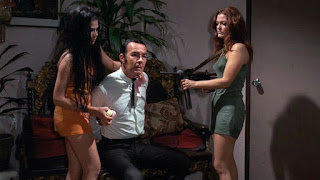Tuesday, February 4, 2020
Tarantino Still Does Not Understand What Makes a Great Exploitation Movie
After watching Once Upon a Time... in Hollywood I realized one clear thing, maybe something that has been evident for a long while. Tarantino does not even understand what makes those exploitation movies he loves so much great to begin with. The exploitation films of Jack Hill were about women liberating themselves from the corrupt system that oppresses them. It's hard to not see those themes in his movies. Foxy Brown, The Big Bird Cage and Big Doll House have anti-establishment language all throughout the narratives. All of those movies have female protagonists fighting against an exploitive system that imprisons them, whether it be prostitution, sex slaves or guerrilla war politics. One of Tarantino's favorite films is Hill's very own Switchblade Sisters where there is a great scene where a female gang kick out a slum lord from their building as he tried to evict poor families from their homes. The gang of women cut off the landlord's tie implying a cutting off of his perceived power or possibly a castration of something else. A scene like that, or themes like in Hill's films seem practically non-existent in Tarantino's films.
From Switchblade Sisters (1975)
When I watched OUaTiH I sincerely thought that Tarantino will for once have something to say besides referring to his career or serving his own fetishes or just paying homage to the films he loves. I understand that there are a bunch of hacky Youtube critics making the case that Tarantino's OUaTiH is "meta" and about ... violence on tv and ...whatever else they can think of to make banal surface level points that are even obvious to the most casual film goers. Just because the movie is "meta" about Hollywood does not make it profound or deep. It's at best just a neat thing he did, but nothing groundbreaking or complex and more so nothing bold either. And that's the problem I have with the film, as with his others, it does not take any bold moves to counter any norms as the great exploitation movies of the 60s and 70s did. Instead he seems to do the opposite. Tarantino seems to be out to make a statement that the establishment is cool and the counterculture is what is wrong with things. Like somebody I know once put it "Tarantino is more interested in John Ford than he is in radical b movie directors." And of course this is true as Tarantino's western film fetish continues well after its welcome.
From The Big Doll House (1971)
It seems that Tarantino is so obsessed with Nostalgia that he fails to have any voice in his current time period of living. What I mean is that Tarantino doesn't refer to the world he lives in now unless it has to do with his career. In OUaTiH the central point or opinion he makes has to do with how Hollywood doesn't make people violent, but it was the drugs and the hippie counter culture that drove those crazy hippies to kill. There was little to no background on Manson's horrific upbringing or any backstory to any of the Manson family whatsoever. Instead they are reduced to cartoon characters. Because of course Tarantino is not interested in how societal structures may ruin people's lives but that the people who critique his violence are just wrong. And that's just about it. That's Tarantino's grand and main focal point. That and it's ..."a love letter to Hollywood" or insert whatever trite take you can here _____.
From Sweet Sweetback's Badasssss Song (1971)
The central critique I'm making about Tarantino is that, other than about his own career, he stands for almost nothing in his movies. Jack Hill painted narratives against female oppression, Melvin Van Peebles stood for giving disadvantaged black communities a voice in cinema, even a director as lowbrow as Bruno Mattei had anti-corporate and environmentalist themes. Tarantino on the other hand stands for ..... nothing, well his own fetishes I guess. The cartoonish violent ending of OUaTiH was so forced and childish that I thought I was looking into the mind of a teenager who created it. It was cinematically dry and had zero suspense to it. But most importantly the campy climax of OUaTiH made me realize that at best Tarantino is the Ken Burns of exploitation movies. He has literally nothing bold or countercultural to say. What he does say is that Nazis are bad, slavery is bad, and the Manson family is bad. He says this with aggression shielded by the safety of hindsight. These are literally the safest stances you can take, added with "let's kill them!" As juvenile as that sounds, it is literally how he thinks and carries out his movies. Like Ken Burns, he just takes something that was generally regarded as bad in history to make a vocal point cinematically, except that Tarantino in turn makes revenge porn out of it.
Tarantino speaking against murders done by police.
So in conclusion I ask Tarantino, what will you say about our time? It was not so long ago he said something about police brutality. I was assuming at some point he would have done a film about it. But instead he gave use the most conservative white male fantasy in his filmography to date. I am still waiting for Tarantino to take that bold leap against the powerful of society, but judging on his recent film I will not hold my breath.
Subscribe to:
Posts (Atom)




